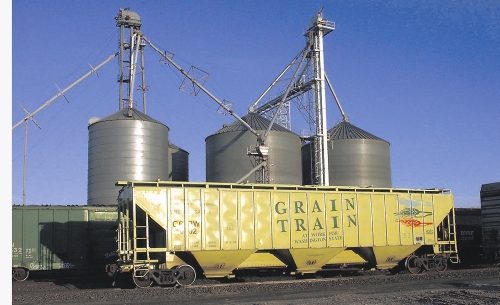forum
library
tutorial
contact

Backlog of Late or Unfilled Grain Railcar
Orders Shrinking But Problems Persist
by Matthew Weaver
Capital Press, March 13, 2023
|
the film forum library tutorial contact |

|
Backlog of Late or Unfilled Grain Railcar
by Matthew Weaver
|
"The larger units may be treated differently than some of the smaller trains."
-- Kevin Gray, general manager Morrow County Grain Growers in Lexington, Oregon
 Hubert Christensen ordered 135 grain railcars last fall during the busy season.
Hubert Christensen ordered 135 grain railcars last fall during the busy season.
He received 74.
The other cars assigned to Hayworth Seed, which Christensen manages, went to a company farther up the rail line, he said.
The Harrisburg, Ore., company loads up to 257 cars a year with wheat bound for export terminals. Christensen hopes to load 160 to 170 rail cars this year, but doesn't know how many to expect to receive.
"I've got more wheat coming in than we can store," he said. "If I get cars, I can take more wheat. If I don't get cars, I can't take what I've got on the books."
The company can load 10 cars a day, and has storage for about 12,000 tons. The export terminal Christensen works with most often only accepts rail shipments. He had to turn down more than 600 acres of wheat last year because of the rail car shortage, he said.
Those farmers elected to store their grain or found trucks to haul it directly to Portland, he said.
"Which cost them more money," Christensen said.
The cost to the company is $200 to $500 per lost car, Christensen said.
He is not alone.
Across the U.S., nearly 8,696 late or unfilled grain car orders were reported, according to the Surface Transportation Board's March 8 weekly service performance report for railroads. The railroads report the data to the board.
For all railroads, 3,750 unfilled grain car orders were 1 to 10 days late, and 4,946 were 11 or more days late.
Most of the late or unfilled rail car orders were operated by BNSF Railway, a subsidiary of Berkshire Hathaway, a conglomerate controlled by billionaire Warren Buffet.
According to the March 8 report, BNSF had 2,632 grain car orders that were 1 to 10 days late, and 4,442 orders that were 11-plus days late.
From December to mid-January, BNSF had a peak of about 15,000 late or unfilled grain car orders. That number has since decreased to about 7,000, according to the board's data.
The peak number was slightly above normal, due to global demand patterns and market dynamics, said Michael Booth, a spokesman for the board. Rail car service and availability can also be affected by weather and rail congestion.
Kevin Gray, general manager of Morrow County Grain Growers in Lexington, Ore., said his company hasn't experienced rail car shortages. Part of that is because the company hasn't brought in many rail cars for the past six months while its elevator was under repair, he said.
Morrow County is a shuttle train-unloader facility, able to bring in Canadian Pacific or Union Pacific trains carrying wheat and corn from the Midwest.
"The larger units may be treated differently than some of the smaller trains," he said.
The company also uses truck and barge service.
Gray said he believes there's been enough industry focus on the problem that solutions are on their way.
"I think the railroad companies are doing whatever they can do to improve for everybody," he said.
For Christensen, rail car availability has been an issue for several years. He's tried contacting the BNSF regional representative, but is still waiting to hear back.
"Why am I given car numbers that I don't get?" he said. "I don't expect to get every car out there, but I expect to at least get my fair share of them."
Related Sites:
LSR Barge to Rail Analysis and Proposal for Resilience, Solutionary Rail
Related Pages:
Ag Shippers Hope Surface Transportation Board Efforts will Improve Rail Performance by Matthew Weaver, Capital Press, 5/12/22
Surface Transportation Board Tells Railroads to Provide Recovery Plans by Matthew Weaver, Capital Press, 5/6/22
Farmers Celebrate $5.6 Million Grant to Rehab Rail by Matthew Weaver, Capital Press, 5/28/19
learn more on topics covered in the film
see the video
read the script
learn the songs
discussion forum
